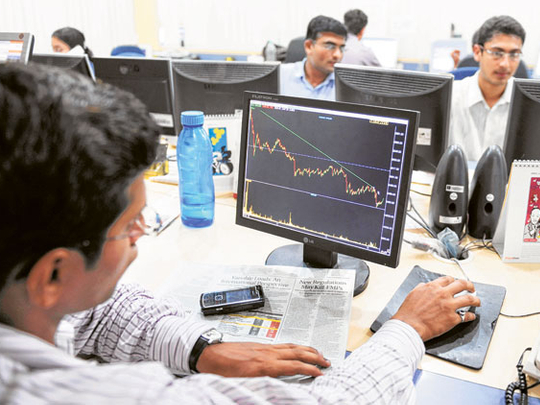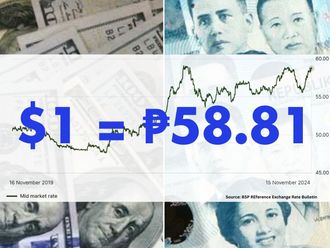
Mumbai: India's plan to boost its debt sales for the second time this fiscal year to a record $96 billion (Dh352.502 billion) is threatening to extend the nation's worst bond losses since 2009.
Yields on 10-year government notes surged 65 basis points in 2011 to 8.57 per cent as bond prices fell, the biggest increase in Asia after Vietnam. Yields fell 53 basis points to 11.64 per cent in Brazil and declined 50 basis points to 3.41 per cent in China. India sold 7.99 per cent notes due July 2017 at a yield of 8.55 per cent on Friday, the highest level at an auction in two months, according to a central bank statement.
Finance Minister Pranab Mukherjee is increasing borrowing to finance a budget deficit as the slowest economic growth since 2009 cuts revenue and a slide in stocks derails plans to sell stakes in state-run companies. Meeting the government's goal to cut its shortfall to a four-year low of 4.6 per cent of gross domestic product by March will be difficult, the finance ministry said last month.
"The economy is slowing and so tax collections and other earnings are dropping, but the government can't afford to cut spending as this would stall growth," said N.S. Venkatesh, head of treasury at Mumbai-based IDBI Bank Ltd. "Bond yields will remain under pressure."
The government will expand its borrowing programme for the fiscal year ending March 31 by Rs400 billion, or 8.5 per cent, the central bank said in a statement after the financial markets closed on Friday. That raises the nation's annual debt sale plan to a record Rs5.1 trillion.
State-owned IDBI Bank and Development Credit Bank predict yields on India's 10-year bonds will climb to 8.70 per cent this month. The extra yield investors demand on the notes over similar-maturity US Treasuries climbed 32 basis points, or 0.32 percentage point, to 669 basis points after the Reserve Bank said in a report on December 22 that the nation's "fiscal stress" may worsen on slowing tax income and increasing subsidies. India last boosted its borrowing target by 13 per cent in September. India's budget deficit reached Rs3.53 trillion, or 85.6 per cent of the annual target, in the eight months through November, the Controller General of Accounts said on its website on Friday. The shortfall was 48.9 per cent of the yearly estimate in the same period a year earlier.
Smallest gain
Asia's third-largest economy expanded 6.9 per cent in the third quarter from a year earlier, the smallest gain in more than two years. Factory output fell 5.1 per cent in October from a year earlier, the first drop since 2009, government data show.
Revenue collection was 49.7 per cent of the full-year target in the eight months through November, compared with 69.9 per cent in the same period in 2008, the report on Friday showed.
Finance Minister Pranab Mukherjee has met only 3 per cent of a target to raise Rs400 billion from the sale of stakes in state-owned firms in the year ending March 31 as India's benchmark share index slid 25 per cent in 2011.
"The overall picture on deficit is quite dismal and will remain so," said Indranil Pan, chief economist in Mumbai at Kotak Mahindra Bank Ltd. He expects the fiscal deficit at 5.7 per cent of GDP this year.
Yields on the 8.79 per cent sovereign debt due November 2021 rose two basis points yesterday after jumping 20 last week, according to the central bank's trading system. That was the biggest increase in benchmark 10-year rates since the five-day period ended October 15, according to data compiled by Bloomberg.
The rupee slid 15.8 per cent in 2011 to 53.0650 per dollar and touched an all-time low of 54.305 on Dec-ember 15, according to data compiled by Bloomberg, as Europe's debt crisis threatened to derail global economic growth and hurt demand for emerging- market assets. It weakened 0.4 per cent yesterday.
Risk
Bond risk in India surged the most since 2008 last year. Credit-default swaps tied to the debt of State Bank of India, seen as a proxy for the nation, climbed 234 basis points in 2011 to 395 basis points, according to data provider CMA, which is owned by CME Group Inc. and compiles prices quoted by dealers in the privately negotiated market.
The swaps pay the buyer face value in exchange for the underlying securities or the cash equivalent should a company fail to adhere to its debt agreements.
Returns on Indian bonds trailed those from Asia's best-performing local-currency debt markets last year. The notes earned 5.9 per cent in 2011, while Indonesian securities returned 22 per cent in the biggest gain among 10 Asian fixed-income markets tracked by HSBC Holdings Plc.
The central bank may need to step up its bond purchases via open-market auctions to boost cash in the banking system and ensure the success of the expanded federal borrowing programme, according to Mumbai-based Development Credit Bank.
The Reserve Bank resumed such purchases of sovereign debt after 10 months in November to ease a cash crunch at banks. It has purchased Rs412 billion of securities at auctions in the past month, official data show.












